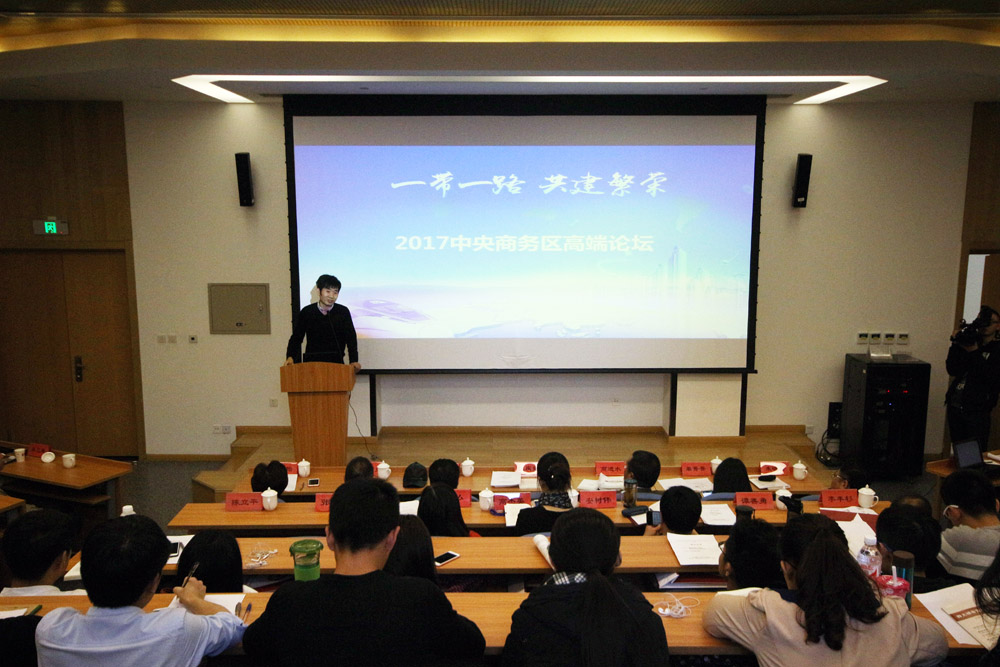CBD Development Summit Held in CUEB
On December 1st, Central Business District Development Summit and 2017 Annual Report on the Research Base of Central Business District Development Conference was held in CUEB. The theme of the forum is Central Business District (CBD) development with its own characteristics.

The 2017 Annual Report on the Research Base of Central Business District Developmentwas the 13th research report in the series published by the Research Base. Li Fengshan, a postdoc,elaborated on the report and introduced the basis for indexselection.The fact that CBD in Futian District, Shenzhen continues to take the lead, and 52 Beijing CBD buildings create tax revenues of over 100 million yuan illustrates that CBD building economy maintains strong momentum, the report found.
In Qingdao emerged 15 more buildings with tax revenues of over 100 million yuan. In Xiacheng District, Hangzhou, 90 buildings hadoverall tax revenues of more than 10 million yuan, 50 of which create tax revenues over 100 million yuan. In Gulou District, Fuzhou, the number of buildings with over 100 million yuan tax revenues amounted to 24 and those with over 10 million yuan hit 115, sending the district into the ranks of Chinese Top 10 Districts with Building EconomyPotential. Overall, megacities’ CBD made sound economic and social development. With the unfailing improvement of CBD functions and specialized services of all kind, CBDs have become a major driver for regional economic and social development.
The opening ceremony was presided over by Wang Manyi, Chief Expert of Beijing Planning Office of Philosophy and Social Science (BPOPSS) Research Base of Central Business District Development (hereinafter referred to as “CBD Research Base”). Zhang Qingxi, Deputy Director of BPOPSS, and Professor Zhu Heliang, Director of CUEBDivision of Academic Researchaddressed the opening.
The keynote speech session was presided over by Professor AnShuwei, Deputy Dean of Academy of Metropolis Economic and Social Development. Gao Jieying, Deputy Dean of CUEB School of Finance gave a keynote speech entitled Research on the Development of CBD Financial Industry in the Context of Beijing's New Urban Orientation, elaborating on the development directions of CBD financial industry from three aspects. Shan Jingjing, researcher fromChinese Academy of Social Sciences made a keynote speech on Promoting China’s Development of Innovative and Smart CBDs. The speech explainedChina’s current developmentof innovative and smart CBDs , the applications of wisdom management, the establishment of smart trading areas, industry convergencefueled by the establishment of innovation andsmart CBDs, the deepening of opening up and the development trend of innovative and smart CBDs in the new era.
Gao Jinshui, director of Review of Economic Research, pointed out that the spirit delivered by the 19th CPC National Congress is a guidance for us to advance the development of CBD with the concepts of innovation, coordination, green, openness, and sharing. Zhu Xiaoqing, professor from Beijing Administration Institute (BAI), delivered a speech titled New Goals, New Ideas, and New Strategies on High-end Service Industry in Beijing. Prof. Zhu mentioned the development of high-end service industry in Beijing should adopt new ideas, act on fresh industrial operating modes, and pool wisdom from different sectors. Thus, we can take a whole industrial chain approach for development and build a financial service platform benefiting all.
Prof. Chen Liping from Capital University of Economics and Business (CUEB) brought us a speech titled Research on Food Supply System Issues in Beijing Urban Centre District. In the speech, he briefed us on some existing problems on food supply, in particular, fresh food supply in urban center against the trend of aging population. Meanwhile, Prof. Chen put forward some constructive suggestions to address those issues.
Prof. Jiang Sangeng, Director of the Research Base of Central Business District Development, gave a speech themed Distinctive Features of Central Business District Development along the Belt and Road. He believed that CBD can play a leading role in B&R node cities for multiple reasons. First, CBD in many big cities, like, Shanghai, Tianjin, Zhengzhou, Shenzhen, and Fuzhou enjoy favorable policies for free trade areas and financial pilot zones. CBDs can vigorously expand trade in goods and services and thus drive the trade development among B&R node cities.
Second, CBD can take advantage of headquarters economy as it is home to financial institutions and corporate headquarters of a province or a city. Headquarters often have the ability to invest in foreign countries, present proposals to policymakers, as well as support financial institutions and local entities to participate in national strategies in terms of settlement and investment.
Third, B&R node cities are transportation hubs of railways, highways and water transports, and transits of trade and logistics. Pooling numerous trade enterprises, CBD can be used to build big-data platforms and credit platforms to promote the development of cross-border e-commerce trade services.
Scholars and experts from Chinese Academy of Social Sciences (CASS), China Finance & Economy Media Group and Beijing Administration Institute (BAI) as well as many CUEB teachers and students attended the forum. Meanwhile, many media, like qianlong.com and Review of Economic Research, covered the forum and press conference.
